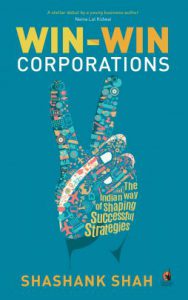
Win-Win Corporations
Author: Dr Shashank Shah
Publication: Penguin
Year: 2017
By Elizabeth F.R. Gingerich
Valparaiso University
elizabeth.gingerich@valpo.edu
As one who has been a long-standing advocate of combining heart and head in conducting business operations or in defining institutional management per se, I naturally gravitated toward case studies which depict several companies consciously opting for long-term, sustainable growth goals over myopically pursuing short-term profits. Over two decades ago, a global proprietor with roots in Atlanta, Georgia emerged as what Forbes termed, the “greenest CEO on Earth.” Ray C. Anderson had taken his carpet company, Interface Global, on what he termed to be a “mid-course correction,” adopting a new operational paradigm – essentially, a new way of thinking – based upon the “triple-bottom-line” metrics of economic performance, social responsibility, and environmental stewardship. The radical change stemming from his self-described epiphany had been largely precipitated by a book that “landed upon my desk.” It was Paul Hawkins’ The Ecology of Commerce. One book caused a complete change of paradigm that affected industry worldwide.
And now we have Win-Win Corporations (WWC) written by scholar, researcher, and teacher, Dr. Shashank Shah, who, over the last decade, has been granted unparalleled access to corporate giants within India – the world’s fastest growing economy. At first glance, the title evokes an image of a motivational manual for how to succeed in business, but upon delving into its chapters, it becomes abundantly clear that the reader has just uncovered a work of art – the encapsulation of the discoveries of one person’s deep, intellectual curiosity into how industry can both prosper and do good – or as Ray C. Anderson instructed 20 years ago, “doing well by doing good.”
Throughout his introduction, Shah incorporates the basic moral teachings of classical scholars and interjects several theoretical and moral underpinnings derived from major world faiths. He emulates a mode of organizational analysis similar to the governance guidelines and performance metrics of the Global Reporting Initiative in Amsterdam, The Netherlands – a triple- bottom-line reporting tool used by the majority of the Fortune 5000 companies and hundreds of thousands of SMEs. But his narrative greatly exceeds any type of commonplace reporting – he actually brings the stories of six major, India-based companies to life and demonstrates how they have all managed to conduct their activities implementing a holistic approach to building stakeholder value.
He relates the development, growth, and challenges of each of the six which cover the following industrial sectors: Banking, Transport, Manufacturing, Hospitality, Energy, and Construction.
Further, he discusses their respective approaches to stakeholder management and in so doing, infuses these accounts with lively anecdotes and detailed interviews. With such access to prominent industry leaders, Shah is able to extract common underlying principles of the selected subjects and present leadership strategies in a manner for others to replicate. He provides a revolutionary demonstration of the “transformative role that businesses can play in society through an approach that balances economic growth and social good.” Specifically, these selected case studies highlight the following conclusions:
• Rules, regulations, investigations, and monitoring can only reign in and control some acts of illegal or immoral conduct; real and lasting change must come from within and permeate the very core of the business proper or other like institution;
• Employees must be an integral and vested part of an entity’s decision-making process; in essence, they must be allowed to contribute their opinions, share their experiences, and be treated with integrity;
• There must be unobstructed access to management as those occupying the highest positions of leadership have fiduciary responsibilities and must serve as societal trustees;
• Employers should provide benefits to their employees that complement monetary compensation; the intangibles of pride and inspiration propel an allegiance that cannot be underestimated;
• Short-term financial gains motivated by greed and myopic thinking must be preempted by a real-world view of all persons and institutions impacted by such actions and decisions;
• By embracing long-term sustainability objectives, management strategists are better able to achieve a comprehensive and diverse consensus which steers their respective organizations to attain long-lasting value that transcends mere quarterly reports;
• Channeling more voices into the decision-making process has allowed these companies to actually embed and preserve cultural heritage and respect for benevolent traditions;
• Leaders must champion collaboration over collusion, dialogue over confrontation, appreciation of experience over the establishment of hierarchal categories, incentivization over career stagnation, and values congruence over division;
• It is important to create and implement an operational paradigm which embodies more of a Gates-type “benevolent capitalism” character as opposed to shaping company policy in congruence with a Freidman monetarist, anti-statist approach;
• Companies must lead exhibiting genuine care of their constituents and strive to build lasting relationships throughout public-private sectors; and
• It is the optimum duty of industry to identify and raise the marginalized, recognizing that all forms of human interaction reflect a symbiotic element.
Each case study of WWC concludes with strikingly helpful and informative “best lessons” for others to emulate and adopt – either in whole or in part, depending upon the nature of their organizations. To further supplement this iteration, the end of the book is equipped with “how-to” toolkits – each providing common underlying themes and moral principles used to generate this win-win strategy.
These companies are not portrayed as the complete panacea to corporate malfeasance and greed worldwide. Shah does not temper his analysis by simply highlighting their acts of beneficence and obfuscating their shortcomings. Instead, he provides comprehensive accountings of the challenges they face and oftentimes fail to overcome. While many of the selected companies have learned from past lessons, they certainly have not been immune from scandal. Most have used their impediments as a springboard to effect positive change, but only after careful reflection and rectification of off-course actions.
Win-Win Corporations is quite simply a merger of heart and mind. It is both engrossing and engaging and has come at a time when the corporate practices of offshoring, outsourcing, and exploitation for quick shareholder profit need to be publicly exposed and rectified. Businesses must be conscious of outlaying deteriorating communities, infrastructure, and general societal hopelessness. WWC provides its readers with possible templates which can be used to help ameliorate such dysfunction. When the challenges are many and examples of emulative leadership are few, these narratives provide examples that not only business students and CEOs can absorb and adopt, but even younger audiences should comprehend and welcome.
The message of this book is more needed now than at any other time. As a global community, we are facing the unprecedented subversion of people’s needs to placate the unbridled greed of a few ― in both politics and business. True leaders must help direct the fight against such unparalleled challenges including the problems associated with escalating Climate Change and global environmental degradation.
WWC should be used as a manual – not just within the business world, but throughout academic circles to guide us all with respect to what and how we are teaching the next generation of leaders and followers. What I hope to see in the future from this author would be an update ― an epilogue of sorts ― to report to the public about how these same companies are responding to the more complicated needs of the larger, collective global stakeholder in relation to changing technologies, rising populations, demand for clean energy, and greater emphasis on regional trade.
This book review was first published in the Journal of Values-Based Leadership, the USA by the Editor-in-Chief in July 2017. Impact News published after an approval from Shah. Link: http://scholar.valpo.edu/jvbl/


















